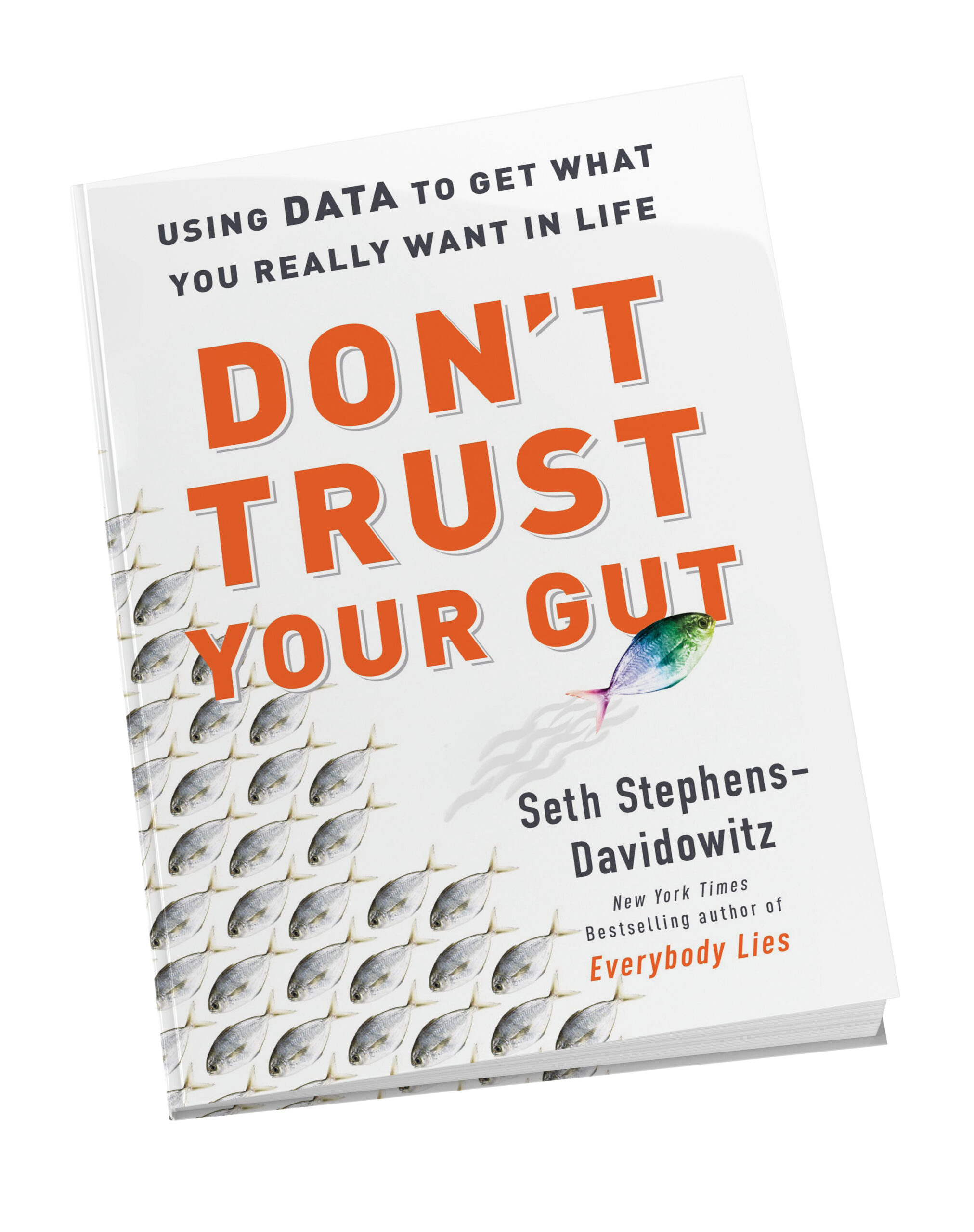 Reviewed by Mira Lares, Qualitative Researcher, Lares Consulting Group, Baltimore, Maryland, mira@larescg.com.
Reviewed by Mira Lares, Qualitative Researcher, Lares Consulting Group, Baltimore, Maryland, mira@larescg.com.
What can data teach us about living a better life? Former Google data scientist Seth Stephens-Davidowitz’s book, Don’t Trust Your Gut, Using Data to Get What You Really Want in Life, makes the case that often data are available to drive decisions about our personal lives that are more reliable than those guided by intuition or instinct. Throughout the book, the author builds the case for a data-driven approach by exploring nine areas for “hacking” our lives, including mate selection, parenting, athleticism, finances, success, luck, appearance, happiness, and modern life.
Using relatable examples, Stephens-Davidowitz demonstrates how data can improve upon our initial human instincts when it comes to making decisions. He also points us to intriguing data sources we can apply in our own lives.
As a parent of two young boys, I was relieved to learn that, statistically speaking, many parenting decisions don’t have as big of an impact as one might think.
The decision that does matter? Where you live, right down to the neighborhood. As Stephens-Davidowitz explains, this has been studied in-depth by Raj Chetty, a professor of Economics at Harvard. In fact, if you want to see how your neighborhood stacks up, you can check at opportunityatlas.org.
Similarly, in the chapter on athleticism, Stephens-Davidowitz discusses college scholarship opportunities in different sports. As a happy coincidence, my older son’s current sport of choice—ice hockey—appears to have quite good odds when it comes to scholarships. Perhaps those cold weekend mornings watching a group of 7-year-olds chase a puck around the ice won’t be for nothing.
Mate selection is another area that Stephens-Davidowitz addresses. He points out that what we might think will make us happy, such as desirability features (think: attractiveness, height, race, occupation), matter much less than four characteristics: satisfaction with life, secure attachment style, conscientiousness, and growth mindset. The findings from research studies, including some that used data from online apps, show that these four areas are the only traits that are predictive of the strength and longevity of a relationship.
When it comes to careers, finances, and success, data can also guide our choices. The author shares his own analysis of the most common routes to becoming a millionaire in the U.S. The short answer? Own a business, and, in a pleasant turn of events for our industry, market research is the predominant field in one of the top seven industries in his “get-rich chart.” (The overarching category is titled “professional, scientific, and technical services.”)
He goes on to explain that amassing knowledge in a certain field provides a barrier to competitors due to the time and expertise of building this knowledge base (market research).
Stephens-Davidowitz also debunks the overnight success story; he looks at luck and questions who gets the coveted “lucky break” and who doesn’t. The data reveal that what matters most is whether you are able to recognize luck and what you do with it. This matters more than how much of it you get. Perhaps we could all use this lesson in awareness and risk-taking.
The final section of the book focuses on overall happiness, with a data-driven list of the activities that make people happiest. He discusses both drivers of happiness and biases that can influence our perceptions of our own happiness. Which activities do we derive the most happiness from? Intimacy/making love, theater/
dance/concert, exhibition/museum/library, etc.
Were you surprised by any of the above? One of my personal favorite cure-alls, nature, is also called out in this section as a leading happiness driver. It turns out those daily walks have extra hidden benefits we know are there but can sometimes be hard to justify.
For me, it comes down to stories versus studies. Expectations versus reality. We’re often awed by the latest and greatest story we hear without always fully understanding the background. If you subscribe to the belief that our thoughts create our reality, how can we expand our awareness to the more grounded studies and give less weight to the flashy headlines we see elsewhere? This book is a great place to start living a more data-driven (and happier) life. I recommend checking out Don’t Trust Your Gut and filling your happiness cup.




